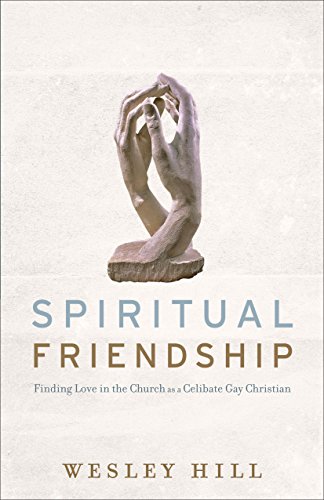By: Wesley Hill (Grand Rapids: Brazos Press, 2015)

Summary:
“Friendship is entirely voluntary, uncoerced, and unencumbered by any sense of duty or debt.” Should it be this way? That is the central question of this book. Using not only Scripture and tradition but also wisdom from personal experience—most notably being a “celibate gay Christian”—Wesley Hill in his book both challenges and endorses friendship. Spiritual Friendship outlines how and why culture celebrates romantic love while downplaying any other kind. Hill fights against the myth that marriage and the nuclear family have ultimate significance. People need “non-sexual, physically intimate same-sex friendship[s]”, and Christian Scripture is robust enough to provide that framework.
History is familiar with friendship in a more intimate way than the twenty-first century West. Hill highlights how up until the seventeenth century there were “wedded” friendships, a “vowed relationship of two male friends.” These were “permanent, honored, church-sanctioned, same-sex friendships.” Hill certainly recognizes the constraints of our current cultural context and yet sees the need for friendships characterized by less than romantic love but being at least equal to brotherhood.
Themes:
- Stories. Whether through books, films, or plays such as Brewster, Of Gods and Men, Magnolia, The Invention of Love, or The Goldfinch, Hill uses narratives to tell a narrative of friendship. The effect achieved is like a conversation with art.
- History. Plato, Aristotle, Cicero, and Orthodox history all make appearances in a historical analysis of conceptions of friendship.
- Scripture. Friendships in the Bible are highlighted: Ruth and Naomi, David and Jonathan, Jesus and John, Jesus and Lazarus.
- Freedom. “[T]he myth that the less encumbered and entangled I am…the better able I am to find my truest self and secure real happiness.” Hill laments the cultural norm of transitory individuals.
- Sexuality. When a celibate gay Christian denies him- or herself sex or marriage, that person needs to fill that gap. Giving up one thing should be the “embrace of another” rather than simply an occasion to “renounce and deny.”
- Friendship. There is much overlap with how friendship can look for the celibate, married, and/or homosexual, but there are also unique considerations for those categories.
Discussion Questions:
- Discuss Hill’s reading of the biblical scene with Simon of Cyrene as an “icon of friendship.”
- Compare and contrast Hill’s book with Augustine’s Confessions.
- In light of this book, interpret and apply John 15:13.
- Discuss the book’s quote from G.K. Chesterton: “Chastity does not mean abstention from sexual wrong; it means something flaming, like Joan of Arc.”
- “Friendship, in a word, is cruciform.” What does Hill mean?
- Define “spiritual friendship.”
- Which of the six suggestions at the end of the book is the most needed? The most difficult?
- Consider reading and discussing some of the posts from Wes Hill’s shared blog, Spiritual Friendship.
- How does this book act as a Christian response to the article “A Bridesmaid’s Lament”?
Drew Trotter